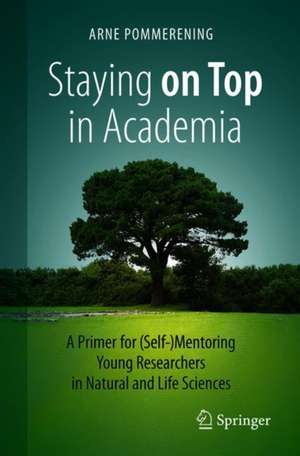Staying on Top in Academia: A Primer for (Self-)Mentoring Young Researchers in Natural and Life Sciences
Autor Arne Pommereningen Limba Engleză Paperback – 26 iun 2021
The first chapter of the book offers an introduction to academic mentoring and provides an overview of what academic mentoring entails. In the following chapters, important topics are discussed that may come up in mentoring conversations. These include scientific thinking, doctoral studies, behaviour and disappointments, scientific storytelling, teaching, scientific presentations, early career years, research cooperation, job applications and basic data management. The discussions in each of these chapters were designed with a view to provide food for thought and to invite self-reflection as well as continued discussions with peers and mentors.
The book is written in a highly accessible style whilst restricting each chapter to the most essential information so that reading them can be accommodated in any busy schedule. It is not limited to any particular university or geographic region, since the author has worked in a number of different countries and encountered many different academic cultures. The text is also a useful handbook and reference to go with mentoring programmes.
Preț: 152.09 lei
Preț vechi: 196.47 lei
-23% Nou
Puncte Express: 228
Preț estimativ în valută:
29.10€ • 31.71$ • 24.52£
29.10€ • 31.71$ • 24.52£
Carte indisponibilă temporar
Doresc să fiu notificat când acest titlu va fi disponibil:
Se trimite...
Preluare comenzi: 021 569.72.76
Specificații
ISBN-13: 9783030654665
ISBN-10: 3030654664
Pagini: 145
Ilustrații: XIV, 145 p. 6 illus.
Dimensiuni: 155 x 235 mm
Greutate: 0.23 kg
Ediția:1st ed. 2021
Editura: Springer International Publishing
Colecția Springer
Locul publicării:Cham, Switzerland
ISBN-10: 3030654664
Pagini: 145
Ilustrații: XIV, 145 p. 6 illus.
Dimensiuni: 155 x 235 mm
Greutate: 0.23 kg
Ediția:1st ed. 2021
Editura: Springer International Publishing
Colecția Springer
Locul publicării:Cham, Switzerland
Cuprins
Foreword (Hubert Hasenauer).- Preface.- Chapter 1. Empowering researchers: Academic mentoring.- Chapter 2. The shape of science.- Chapter 3. Doctoral studies and all that.- Chapter 4. Early career years.- Chapter 5. Scientific storytelling.- Chapter 6. Scientific presentations.- Chapter 7. Research-driven teaching.- Chapter 8. Research cooperation and job applications.- Chapter 9. Behaviour and disappointments.- Chapter 10. Sustainable data management.
Notă biografică
Arne Pommerening works as Professor in Mathematical Statistics Applied to Forest Sciences at the Swedish University of Agricultural Sciences (SLU) in Umeå. He is a theoretical forest scientist and his research areas include woodland structure analysis and modelling, spatio-temporal dynamics of plant point patterns, individual-based modelling with a focus on plant interactions, plant growth analysis, methods of quantifying and monitoring biodiversity and the analysis of human behaviour of selecting trees. He has also developed a keen interest in the question of how marked point patterns based on mapped plant communities evolve through time. The ontogenesis of such patterns can be studied by using individual-based models, which is an intriguing field of research. Much of his research is in quantitative ecology including computer-based simulation experiments and it is strongly interdisciplinary and international.
Textul de pe ultima copertă
The pace of change in academia is ever increasing, which makes it difficult for anyone to stay up to date with what may be the right long-term strategy, or even the next step in mastering a PhD or to secure a fruitful academic career. Academic mentoring has proved to be helpful to many young researchers in difficult situations and mentoring programmes have been launched at many universities. In its most basic meaning, mentoring is a goal-oriented off-line conversation between a more experienced (mentor) and a less experienced (mentee) person with the objective to empower the mentee to make important work-related decisions.
The first chapter of the book offers an introduction to academic mentoring and provides an overview of what academic mentoring entails. In the following chapters, important topics are discussed that may come up in mentoring conversations. These include scientific thinking, doctoral studies, behaviour and disappointments, scientific storytelling, teaching, scientific presentations, early career years, research cooperation, job applications and basic data management. The discussions in each of these chapters were designed with a view to provide food for thought and to invite self-reflection as well as continued discussions with peers and mentors.
The book is written in a highly accessible style whilst restricting each chapter to the most essential information so that reading them can be accommodated in any busy schedule. It is not limited to any particular university or geographic region, since the author has worked in a number of different countries and encountered many different academic cultures. The text is also a useful handbook and reference to go with mentoring programmes.
Caracteristici
Combines an introduction to mentoring with hands-on career advice The text is written in a concise and accessible way so that if fits in any busy schedule Important information is highlighted in boxes for easy access A reference list encourages further reading Drawn on extensive experience in educating doctoral students and as a researcher working in a number of countries and
